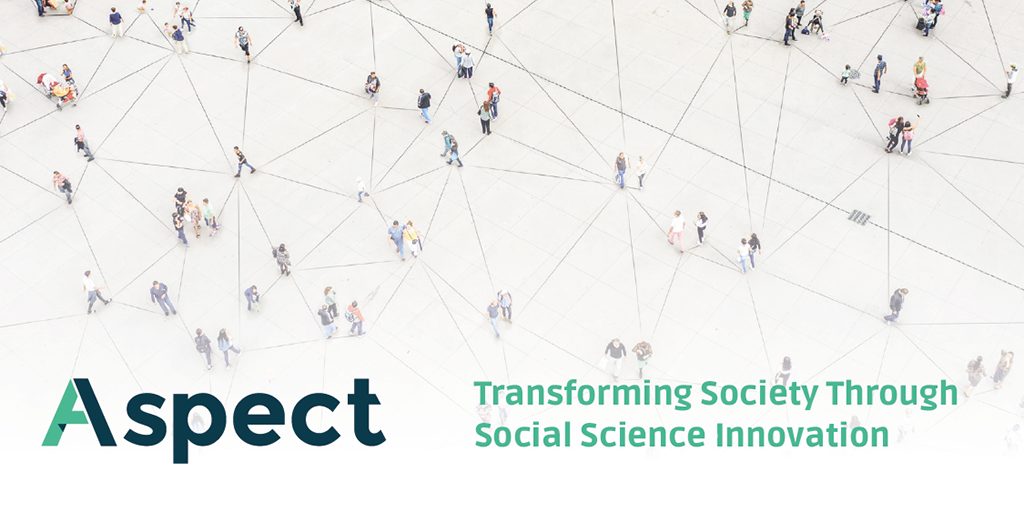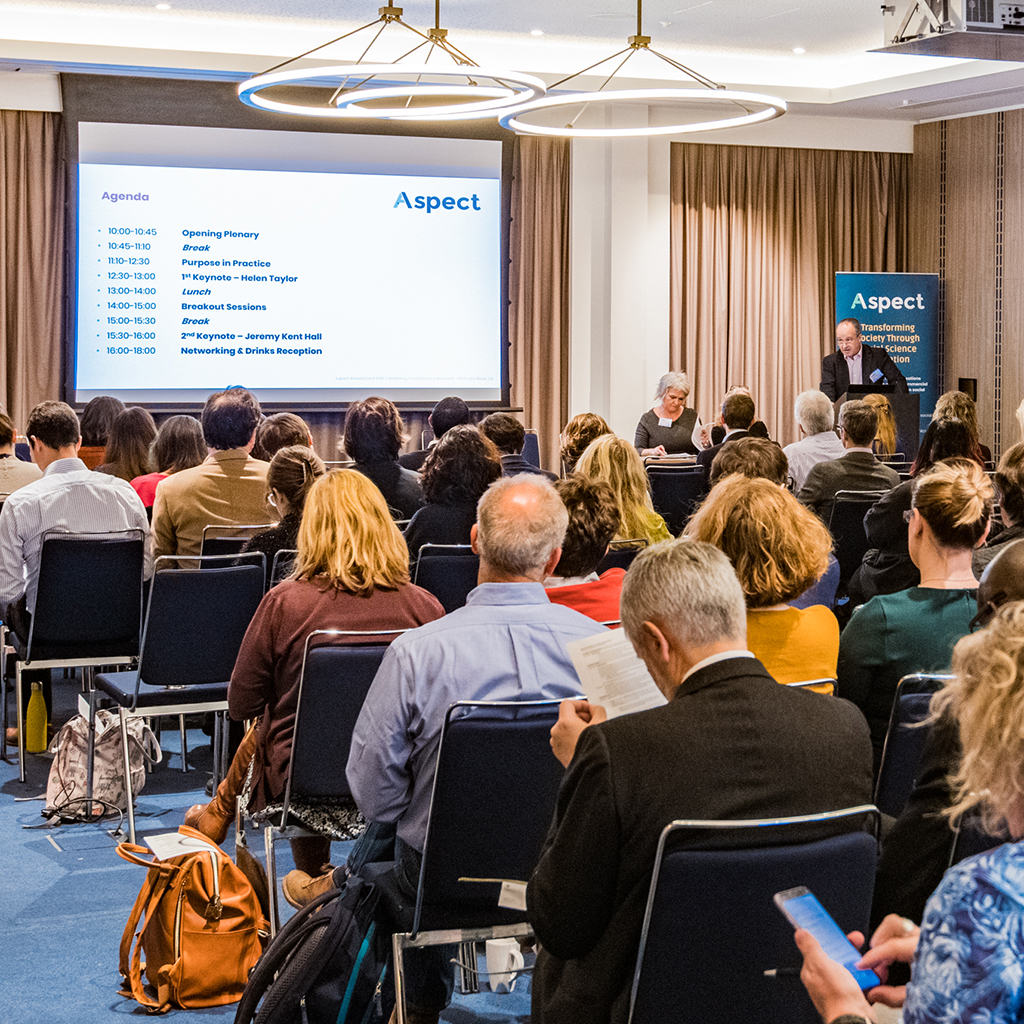
Aspect event recap: Better Business for People and Planet
By Mike Scott, Carbon
Copy Communications
4 December 2019
The world faces some huge challenges, from climate change to ageing societies, mental health to the impact of globalisation and automation. To date, many of the solutions to these issues have been technological, and universities have a clear role to play in bringing new technological solutions to fruition. But there is a growing realisation that many of these problems cannot be solved without input from social scientists.
On 21 November, the Aspect network hosted an event to bring together KEC practitioners, social scientists, funders, and industry representatives to explore the theme of “sustainability”. The event highlighted examples of how social sciences can drive behaviour change towards a more sustainable world, and emphasised that this is much more likely if academics collaborate – with their peers in other disciplines and other institutions, with business, with government and with civil society.
Why social sciences?
Aspect, the Research England funded CCF programme focused on transforming social science research into solutions for society, has held its inaugural event in Manchester. Entitled Better Business for People and Planet – Bridging Research and Industry, the conference focused on how social sciences research can help tackle some of the key sustainability challenges of our times.
While the commercialisation pipeline for STEM research is well established, the benefits and profile of research commercialisation within the social sciences are less well known. Aspect seeks to redress this balance by connecting universities, businesses, academics and industry leaders to turn ideas into commercial solutions and solve pressing social challenges.
Aspect is led by the London School of Economics and Political Science, alongside the universities of Manchester, Sussex, Oxford, Sheffield, Cardiff and Glasgow. The final partner is Zinc, an LSE-backed “venture builder” that builds companies that tackle important societal challenges.
We need to bring the research and the development together to tackle some of the world’s biggest challenges, from the ageing society to mental health to climate change.
Paul Kirby, CEO of Zinc
Paul Kirby, CEO of Zinc, explained why Aspect is needed. “In technology and pharma, anyone in academia knows there is a well-established commercial system, starting with seed funding and venture capital right up to some of the world’s largest corporations. But there are 600,000 social science academics not plugged into the science commercialisation system.
“Yet the areas that social science deals with – how people think, feel and behave, how businesses and governments respond to that and change that – are things that all organisations are doing. They’re just not plugged in to good social science. Most academics are just doing research. Most businesses are just doing development. We need to bring the research and the development together to tackle some of the world’s biggest challenges, from the ageing society to mental health to climate change.”
Critical agenda
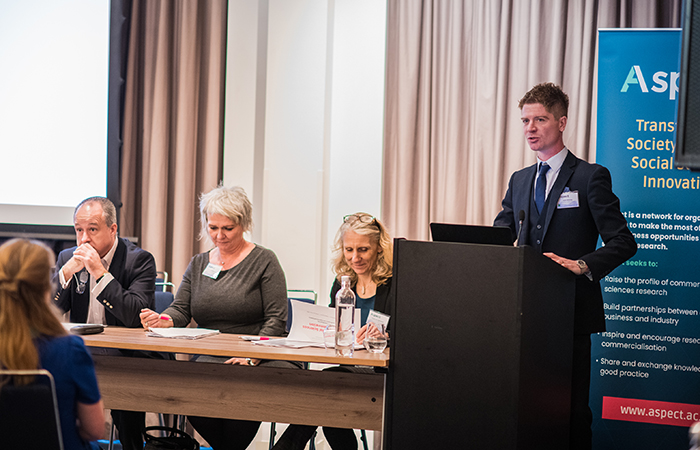
“This is a critical agenda”, explained Andrew James, associate dean for Business Engagement & External Relations at the University of Manchester, “in a world where we face a number of grand challenges such as climate change and the ageing society. The social sciences have a key role to play in understanding problems and turning knowledge into effective programmes. However, the commercialisation of social science requires novel forms of scholarship. The Manchester Law and Technology Initiative, for example, is a collaboration that spans the School of Law, the Alliance Manchester Business School and the School of Computer Science as well as local legal firms.
“Sometimes, I feel that business has a better sense of the value of social science than we do,” he added. “There is an increasing understanding that acquiring all the technology is not enough. For example, in a field like fintech, it’s not just about computer science and data science. We have projects led by social scientists looking at digital literacy and financial wellbeing. There is huge potential to promote engaged scholarship.”
Supporting social science is not like supporting STEM … It’s much more about the business model, know-how and data than it is about intellectual property.
Professor Julia Black, Strategic Director for Innovation at LSE
Aspect is not just a snappy name, but a useful acronym explaining what the organisation does, said Professor Julia Black, strategic director for Innovation at the LSE. “It stands for A Social sciences Platform for Entrepreneurship, Commercialisation and Transformation,” she said. “It is a way to mobilise our world-leading social science research.”
The organisation draws together academics and businesses to turn ideas into solutions and tackle the most complex social problems, she added. Technological solutions can only ever be part of the solution, she pointed out. “It’s also about behaviour change, the design and operation of markets and a range of other issues.
“Supporting social science is not like supporting STEM,” she said. “It’s much more about the business model, knowhow and data than it is about intellectual property.”
Research with a purpose
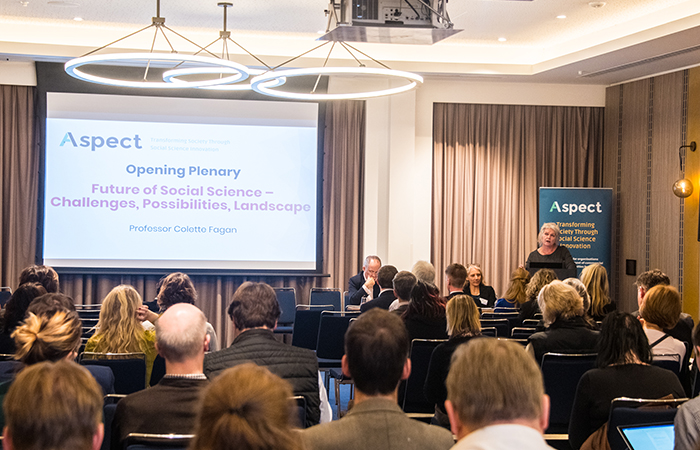
And while the current research landscape is very uncertain because of political uncertainty around the world, “there is a growing emphasis on research with a purpose,” Colette Fagan, Manchester University’s vice-president for research told the conference.
“We want our research to make an impact so we need to bring together teams to work on shared challenge-based issues. We need to start thinking about commercialisation and innovation because the answers to some of our biggest challenges can’t be found without the social sciences.” Social science can help with people’s willingness to adopt new technology, she added.
“Social scientists don’t make things that hurt when you drop them on your toes,” pointed out Joanne Tippet, lecturer in Spatial Planning in the School of Environment and Development at the University of Manchester. “The bit we do is integration – we make things work a bit better. We often turn to economic measures because they are more tangible, but what we do is hard to measure.”
The conference was an opportunity to explore how different universities can learn from each other and develop partnerships – among academics, between academics and professional services teams and with outside collaborators including policy makers, local communities and businesses.
Many of my clients don’t see a conflict between profitability and sustainability.
Teresa Hitchcock, Partner at DLA Piper LLP
In a session on Purpose in Practice, Mariel Vilella, director of global strategy at Zero Waste Europe, explained that “we need to transform the way we produce, consume and do business. The move from a linear economy to a circular one will need social sciences.”
Teresa Hitchcock, head of law firm DLA Piper’s UK Safety Health and Environment team, highlighted that change will take time and that a collaborative approach is essential, but “many of my clients don’t see a conflict between profitability and sustainability”.
Collaboration is essential, she added, citing the Legal Sustainability Alliance, which she helped to set up in 2007. “It’s a forum that allows other firms to benefit from our experience and we can help small firms become more sustainable.”
Purpose is not enough
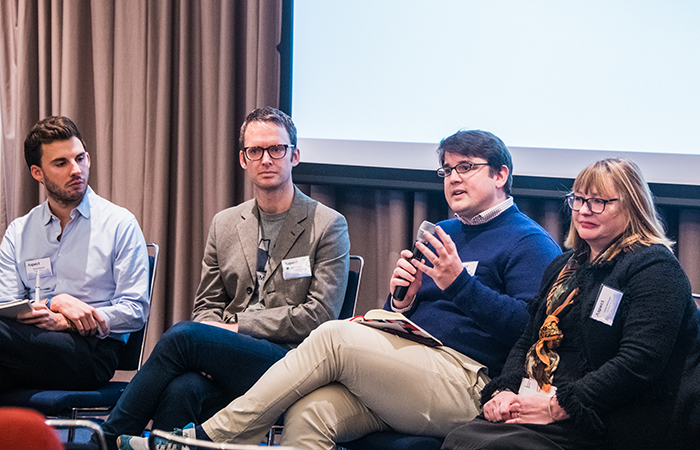
But Duncan Gray, founder of international sustainability and responsible businesses consultancy Brodie, pointed out that having a purpose is not enough, and is no guarantee that your business will be successful. “You don’t have the right to succeed just because you have a purpose.”
He highlighted some of the ways that purpose is used – to create a platform and a halo effect for a brand, as with American Express’s Small Business Saturday campaign; for more direct brand-building, such as Unilever’s Lifebuoy soap, which runs a long-established campaign to promote handwashing. The campaign helps to reduce diarrhoea and tackle disease in developing countries but at the same time it will help the company sell more soap.
Then there are entire companies built around purpose, one of the most famous being Toms Shoes, which gives a pair of shoes to a child for every pair purchased. “It’s completely changed the sector. Now there is a whole industry selling sustainable shoes – there’s competition to be the most sustainable.”
Finally, Gray explained that some companies are engaged in ‘purpose washing’ to cover up other issues. “Uber says it does the right thing, for example, but I just don’t think it can stand it up. Their behaviour in too many markets shows no responsibility for drivers or the people who use their cars.”
But done right, purpose can help businesses, by attracting and retaining talent, building brand salience and boosting reputation. And in a complex world, it can cut through some of that complexity by making it clear what the company aims to do.
John Pritchard from Pala Eyewear and Thomas Bouvier from Soaper Duper explained different ways that companies can maximise their impact on people while minimising their impact on the planet.
We want to maximise our impact on people but minimise our impact on the planet.
John Pritchard, Founder, Pala Eyewear
Pala has set up a number of vision centres in Africa but is also focused on reducing the impact of its spectacles by using bio-acetate for the frames, biodegradable packaging and making glasses cases from plastic that would otherwise have gone to landfill. “We want to maximise our impact on people but minimise our impact on the planet,” he said
Soaper Duper not only makes environmentally friendly products, using recycled packaging, it also tries to change the behaviour of its customers through innovations such as sending its e-commerce products in a box that can be used as a recycling bin for the bathroom. “Nine out of 10 people recycle in the kitchen, but only four out of 10 do so in the bathroom. We need to raise awareness,” Bouvier said.
As well as focusing on making its products as clean and green as possible, the company also has a partnership with Water Aid to promote hygiene and increase access to water in communities without it.
Ecotricity embraces climate challenge
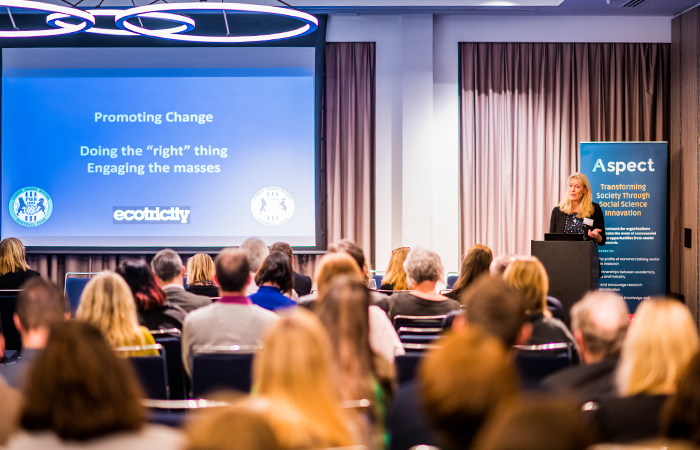
The summit then heard about the extraordinary story of Ecotricity, the green electricity company started by former traveller Dale Vince. He started the company after making his own wind turbine then travelling to Germany to learn about the technology from the leading manufacturer at the time, Enercon, and then becoming their UK agent. “It started because he decided he wanted to fight climate change, but he’s always thought about it from a wider perspective. It’s not just about the energy you use but also the food you eat and the transport you use.”
The company was also involved in creating the first electric vehicle charging network on the UK’s motorways in collaboration with Nissan and the UK government.
We wanted to showcase what Ecotricity believes in. But we don’t force the green aspects on people. They are just immersed in it.
Helen Taylor, Ecotricity and CEO of Forest Green Rovers
Ecotricity, based in Stroud, has crossed over into the world of sport, after Vince got involved in his local football team, Forest Green Rovers in 2010. Since that time, he has made it the greenest football club in the world. “We engage a lot of people and we can empower them to make change,” said Helen Taylor, the CEO of Green Forest Rovers. “That’s the role of social science – it’s about behaviour change. ”
Vince has made the club’s pitch both organic and vegan, as is all the food sold in the stadium. “We wanted to showcase what Ecotricity believes in. But we don’t force the green aspects on people. They are just immersed in it.”
Taking research to market
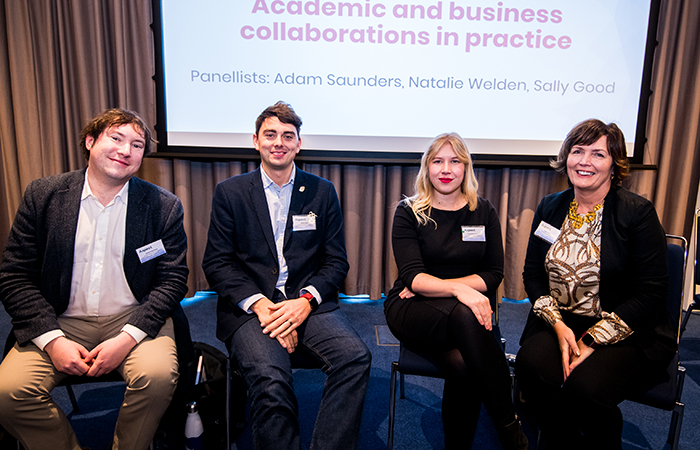
By way of contrast, the next session dealt with the challenges of academic/business collaborations, which highlighted the role of commercialisation organisations that take successful evidence-based research to market. “We’re a bridge between successful research and problems that need to be solved,” said Sally Good, COO of Evidence to Impact, a social sciences spinout from the universities of Bristol and Cardiff.
Adam Saunders, research fellow at the Centre on Skills, Knowledge and Organisational Performance at the Department of Education at Oxford University, talked about the work he is doing through the Industrial Strategy Challenge Fund, on projects such as the Faraday Challenge, which focuses on battery technology, energy storage and electric vehicles, and Next-generation Services, which focuses on the future of legal services, insurance and accountancy. “It’s not just dealing with business, but also seeing how business and universities fit into a broader ecosystem.”
At the same time, within the academic community, “we’re working with people from engineering, mathematics, and the life sciences,” he said.
It’s not just dealing with business, but also seeing how business and universities fit into a broader ecosystem.
Adam Saunders, research fellow at SKOPE, Oxford of University
Adam Root, founder of Inheriting Earth, which is working on a project that seeks to reduce the flow of textile derived microfibres between our washing machines and the domestic environment, highlighted the importance of having credible, validated science from a reputable researcher to back up your product. “Working with a researcher who has the right expertise is a real ‘sticker of truth’”, he said.
Dr Natalie Welden, lecturer in Environmental Science and Sustainability in the School of Interdisciplinary Studies at the University of Glasgow, who has been working with Mr Root, said that every early-career researcher needs to work with someone like him, with a shared ethos. “There’s a lot of trust as a researcher, aligning what you are researching with what they are doing as a company. What if it doesn’t work?”
Scaling up social sciences spinouts
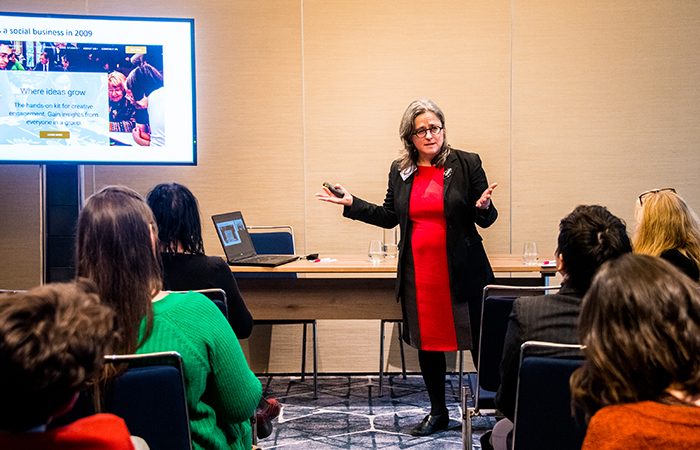
While one group discussed working with business to take ideas to market, a parallel discussion explored different perspectives on how to “scale up” social sciences spinouts. Melanie Knetsch, Deputy Director of Impact and Innovation at ESRC set the scene by suggesting that scaling up is a great way to think about sustainability and the creation of long-term impact. Panellists then went on to share two perspectives about how to overcome the barriers, and leverage the opportunities, associated with social sciences spinouts. Joanne Tippett from The University of Manchester shared an academic’s perspective, while Bruce Etherington from Cardiff University talked about a technology transfer officer’s view.
To start off, Joanne Tippett talked about Ketso Kit – one of the first spinouts from ESRC funded-research – a portable kit that helps teams and stakeholders share ideas and ensure everyone’s voice is heard. Embedded in the business is the idea that good community engagement is essential to problem solving and that a physical toolkit that makes it easier to do this. Joanne launched the social business in 2009, and the Ketso Kit has since been used by over 28,000 people in 77 countries.
There is still a real distaste for business and ‘making money’ in social sciences… it can be seen like you are selling snake oil if you try to publish in the same area. It’s still an awkward fit.
Dr Joanne Tippett, Ketso Kit founder
For Joanne, this venture was a way for her to create real social value and personal satisfaction, and it has even led to others writing over 50 peer-reviewed publications and further research. But this did not come without obstacles. Her first learning point was not so much about the value of the Ketso kit itself, but the process it was supporting: “We had to convince people of the worth of doing community engagement in the first place.”
Being creative about how to bring an idea forward, and aligning with partners who share your interest is also critical for success. Joanne worked with the university support staff at UMIP to secure a trademark and develop a business model for Ketso, including figuring out how to get the product manufactured at scale, with a supply chain stretching from England to Bangladesh.
Yet despite creating real value from research, social scientists who opt to commercialize their ideas may still face cultural barriers within academia. “There is still a real distaste for business and ‘making money’ in social sciences… it can be seen like you are selling snake oil if you try to publish in the same area. It’s still an awkward fit.” Changing perceptions will take time, but stories like Ketso can help to pave the way.
Bruce Etherington from Cardiff University then went on to discuss how universities can support academics in this process, and some of the barriers they may face along the way. Despite being on a “commercial team”, Bruce noted that he does not have commercial targets. “Our role is about how to maximise social good, and where to get money to make that happen. It’s not about making money, it’s about funding social good.” One of the critical success factors for Cardiff has been to create close partnerships between academics and commercial teams, via an “embedded support” model. “We are learning not to treat technology transfer as distinct from the researcher’s project team – we want to encourage academics to see us as part of their team.”
Unintended consequences are inevitable
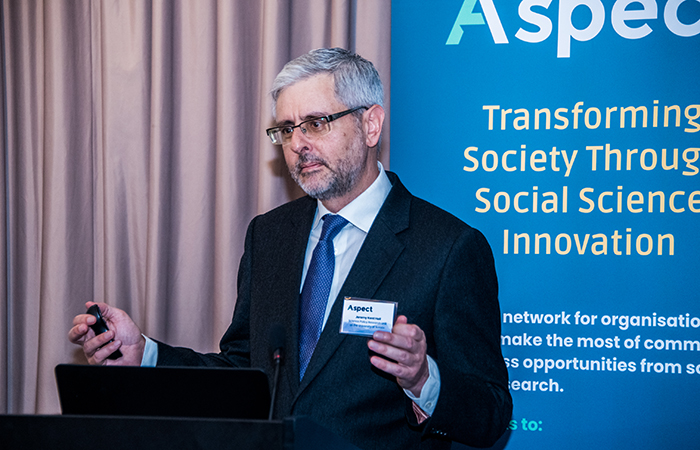
The day ended on a warning note that people need to beware of the unintended consequences of innovation. Jeremy Kent Hall, director of SPRU (Science Policy Research Unit at the University of Sussex), cited Borlaug’s paradox. Named after Norman Borlaug, who is credited with saving a billion lives by creating ways of improving agricultural yields.
Borlaug managed to effectively eradicate global hunger, Kent Hall said, but this led to a population explosion and the severe environmental challenges that we are having to deal with today. “Innovations solve some problems but then create others. It will happen with the innovations we are seeing today. It is inevitable.”
Download this resource as a PDF
What’s next for Aspect and how can you get involved?
The Aspect programme is launching in early 2020 and will include workshops for Aspect Community of Practice Members, pilot projects, resource development, events, and other activities to stimulate and support social sciences innovation. Join the Aspect mailing list using the form at the bottom of this page, or to talk to the Aspect team about how you can get involved and become a member, register your interest or contact info@aspect.ac.uk.
